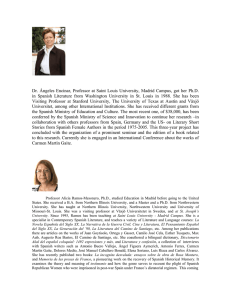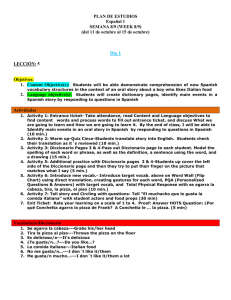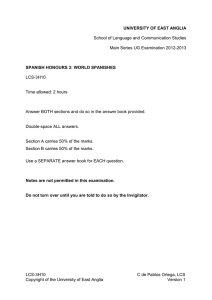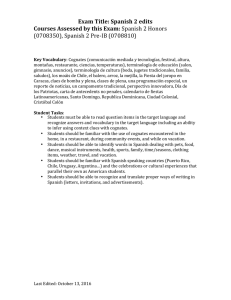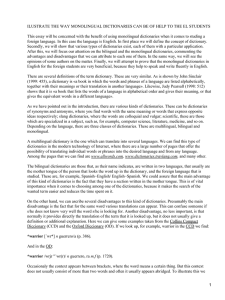Environmental Terminology in General Dictionaries 1
Anuncio
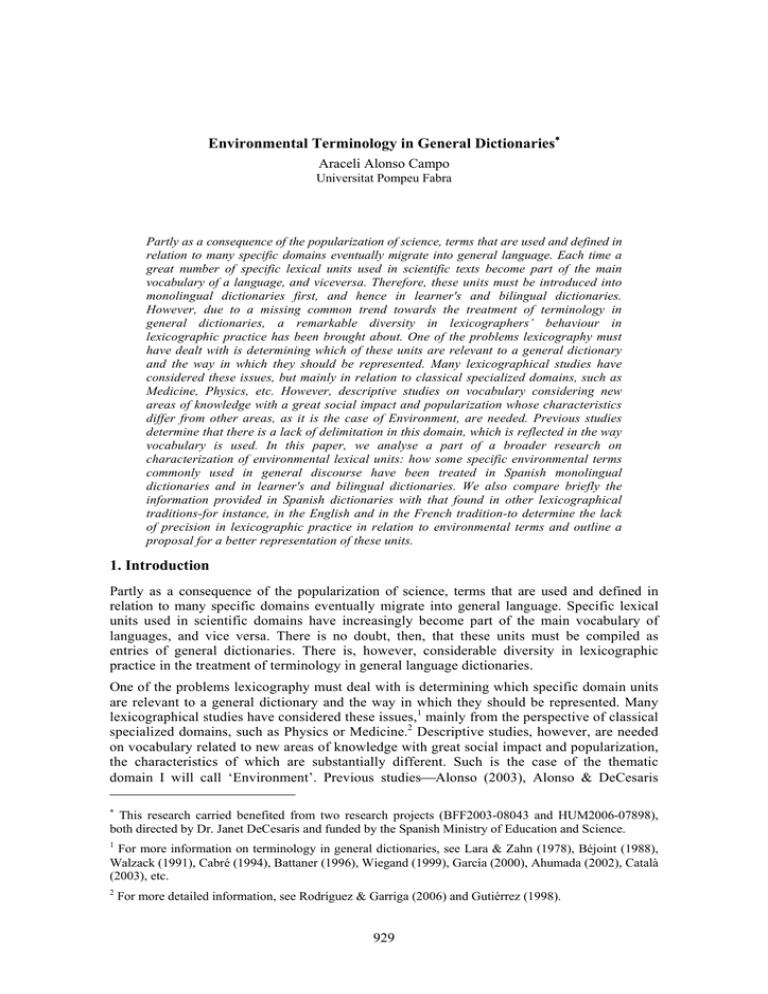
Environmental Terminology in General Dictionaries∗ Araceli Alonso Campo Universitat Pompeu Fabra Partly as a consequence of the popularization of science, terms that are used and defined in relation to many specific domains eventually migrate into general language. Each time a great number of specific lexical units used in scientific texts become part of the main vocabulary of a language, and viceversa. Therefore, these units must be introduced into monolingual dictionaries first, and hence in learner's and bilingual dictionaries. However, due to a missing common trend towards the treatment of terminology in general dictionaries, a remarkable diversity in lexicographers’ behaviour in lexicographic practice has been brought about. One of the problems lexicography must have dealt with is determining which of these units are relevant to a general dictionary and the way in which they should be represented. Many lexicographical studies have considered these issues, but mainly in relation to classical specialized domains, such as Medicine, Physics, etc. However, descriptive studies on vocabulary considering new areas of knowledge with a great social impact and popularization whose characteristics differ from other areas, as it is the case of Environment, are needed. Previous studies determine that there is a lack of delimitation in this domain, which is reflected in the way vocabulary is used. In this paper, we analyse a part of a broader research on characterization of environmental lexical units: how some specific environmental terms commonly used in general discourse have been treated in Spanish monolingual dictionaries and in learner's and bilingual dictionaries. We also compare briefly the information provided in Spanish dictionaries with that found in other lexicographical traditions-for instance, in the English and in the French tradition-to determine the lack of precision in lexicographic practice in relation to environmental terms and outline a proposal for a better representation of these units. 1. Introduction Partly as a consequence of the popularization of science, terms that are used and defined in relation to many specific domains eventually migrate into general language. Specific lexical units used in scientific domains have increasingly become part of the main vocabulary of languages, and vice versa. There is no doubt, then, that these units must be compiled as entries of general dictionaries. There is, however, considerable diversity in lexicographic practice in the treatment of terminology in general language dictionaries. One of the problems lexicography must deal with is determining which specific domain units are relevant to a general dictionary and the way in which they should be represented. Many lexicographical studies have considered these issues,1 mainly from the perspective of classical specialized domains, such as Physics or Medicine.2 Descriptive studies, however, are needed on vocabulary related to new areas of knowledge with great social impact and popularization, the characteristics of which are substantially different. Such is the case of the thematic domain I will call ‘Environment’. Previous studies⎯Alonso (2003), Alonso & DeCesaris ∗ This research carried benefited from two research projects (BFF2003-08043 and HUM2006-07898), both directed by Dr. Janet DeCesaris and funded by the Spanish Ministry of Education and Science. 1 For more information on terminology in general dictionaries, see Lara & Zahn (1978), Béjoint (1988), Walzack (1991), Cabré (1994), Battaner (1996), Wiegand (1999), García (2000), Ahumada (2002), Català (2003), etc. 2 For more detailed information, see Rodríguez & Garriga (2006) and Gutiérrez (1998). 929 Araceli Alonso Campo (2005, 2006, 2007)⎯have found that there is a lack of delimitation in this domain, which reflects the way vocabulary is used. 2. The domain of Environment and Environment-related lexical units Environment as a field of knowledge emerges due to the awareness of societies about the deterioration of nature as a consequence mainly of industrial and technological development. It is a specific domain the characteristics of which differ from those of other, more classical specialized areas. It is relatively new as an academic discipline; it is very dynamic, as it changes greatly over time; it is socially interesting, as it concerns everybody; it is formed by different systems (physical, biological, social, economical, political and cultural) in which people interact with other living creatures; it studies all the factors that affect this interaction, and, therefore, draws on many other disciplines. As Myerson & Rydin (1996) have pointed out “environment belongs to every discipline and to none.” Environment does not fit into the hierarchical structures that have been used to represent classical scientific fields. Instead, it can be seen as a network of interconnected topics in relation to other specialized areas which can be studied from many different perspectives.3 As a result of this field’s own peculiarities, the language used to talk about Environment has its own specific characteristics which are reflected in its vocabulary: being a current field, Environment-related words have not been standardized and there are many variants for each form. Due to its interdisciplinary and dynamic character, many terms are borrowed from other specialized areas, either maintaining or changing their meaning. Furthermore, it is a domain that is sociologically and geographically limited, the characteristics of which are closely related to the geography of a specific environment and the people who live in that environment, which is also reflected in the vocabulary used. Since it is a field with a great social impact, many Environmentrelated terms migrate to the general language and become a part of a speaker’s idiolect. As they are part of a speaker’s vocabulary, these Environment-related words that have become part of the general language must be included in general dictionaries. However, after having a quick look at dictionaries, it can be said that Lexicography as a field has paid little attention to Environment-related words. There are few studies on Environmental vocabulary in Spanish (Bracho 2004 being one of the few), and noted above, there is a lack of precision at using environmental words, which translates into a non-systematic representation of these words in both general and specialized dictionaries. If we start from the assumption that a general dictionary is a reflection of the linguistic competence of a general speaker of the language; as Lara (1990: 29-20) points out: “un diccionario es, entonces, fundamentalmente un depósito de la experiencia social manifiesta en palabras, que deriva su valor de su capacidad de superar la memoria de cada uno de los individuos que componen la sociedad” (a dictionary is mainly a repository of the social experience shown by words, the value of which derives from its ability to go beyond the memory of each individual belonging to the society), there is no doubt that many commonly used Environment-related words are actually part of the general lexicon. A problem arises when representing these subject-marked units in general dictionaries. The common trend in Spanish lexicography to indicate that a sense of a word belongs to a specialized area is to mark it with a subject label. For instance, a total of 72 subject labels4 for representing 19,160 senses in 12,120 entries are used in the most recent edition of the Spanish Real Academia’s Diccionario de la lengua española (2001). However, the use of subject 3 This idea is taken from Myerson & Rydin (1996:7) who explains the language of Environment from a rhetorical point of view by means of the metaphor of “the environet”, a network making linkage upon linkage between the Environment. It seems that this metaphor may also be used for determining how this domain is structured as a field of knowledge. 4 For a contrasting study on the use of subject labels in the different editions of the Spanish Real Academia’s Diccionario de la lengua española, see Battaner (1996). 930 Section 5. Lexicography for Specialised Languages - Terminology and Terminography labels does not seem to be the best solution. The treatment of specialized lexical units in general dictionaries brings about many problems which have not been solved yet. According to Battaner (1996), “la característica de ‘especializado’ es algo no regulado en los diccionarios de la tradición española” (the characteristic of ‘specialized’ is something that has not been regulated in the Spanish tradition). 3. Representation of Environment-related lexical units in general dictionaries In order to study the treatment of environmental words in Spanish monolingual, learner’s and bilingual dictionaries, five environmental lexical units commonly used in general language have been analyzed: a noun —reciclaje (recycling)—, three adjectives —verde (green), ecológico (ecological) and sostenible (sustainable)— and a verb —tratar (to treat). The information provided in Spanish dictionaries has also been compared with information found in dictionaries of English. The following monolingual and learner’s dictionaries were taken into consideration in our analysis: the Spanish Real Academia’s Diccionario de la lengua española (21st ed.; hereinafter DRAE), María Moliner’s Diccionario de uso del español (3rd ed.; hereinafter DUE), Diccionario CLAVE (5th ed.; hereinafter CLAVE), for Spanish; and the Oxford English Dictionary Online (2nd ed.; hereinafter OED), the New Oxford American Dictionary (2nd ed.; hereinafter NOAD), the Longman Dictionary of Contemporary English (4th ed.; hereinafter LDCE), for English. We looked up all the entries in the general language dictionaries of Spanish,5 paying special attention to the following aspects in order to indicate the use of the lexical units as Environment-related words: the meanings related to Environment indicated for each entry, the use of a subject label, the use of a definition explicitly indicating the relationship to Environment, the use of an illustrative example, the use of a note, the use of cross-references, the use of a specific collocation related to Environment and the use of synonyms or related words. Let us look at the entries for verde6: [DRAE] verde. (Del lat. virĭdis) 14. adj. Se dice del lugar destinado a parque o jardín y en el que no se puede edificar. Zona, espacio verde. 15. adj. Se dice de ciertos partidos ecologistas y de sus miembros. [DUE] verde (del lat. «virídis») 6 adj. y n. m. Se aplica a los partidos políticos ecologistas y a sus afiliados. ¤ m. pl. Organización política ecologista: ‘Los verdes han obtenido un excelente resultado en las últimas elecciones’. 7 adj. Se aplica a la zona urbanística no edificable, reservada para jardín o parque: ‘Zonas [o espacios] verdes’. [CLAVE] verde adj.inv. 6 Referido esp. a una zona o a un espacio, que están destinados a ser parques o jardines y en ellos no se puede edificar: En este barrio hay muchas zonas verdes. adj.inv./s.com. 11 Ecologista o que defiende la necesidad de la protección del medio ambiente y unas relaciones más armónicas entre las personas y su entorno: Los verdes se oponen a la construcción de centrales nucleares. None of the dictionaries compile the use of the adjective verde applied to products whose production or consumption is considered to be environmentally friendly. DRAE indicates the use of verde referring to ecologista as an adjective but not as a noun. None of the dictionaries 5 Due to space constraints, the entries corresponding to the five lexical units cannot be illustrated in this paper. 6 Only the Environment-related meanings are indicated. 931 Araceli Alonso Campo use subject labels to show that the meaning is related to Environment, though we know use of labels is a common practice in DRAE and DUE. Only CLAVE mentions the word environment in the definition. DUE and CLAVE include illustrative examples, whereas DRAE only provides a definition. In all cases, only the collocation zona verde is included. There is no use of notes, cross-references or synonyms or related words in any case. We can classify our observations for the five lexical units according to the following parameters: - Variety of Environment-related meanings ⇒ Not all the different uses of words in Environment-related texts are represented. CLAVE represents more meanings related to Environment than the other dictionaries; for instance, in the case of ecológico, only DUE includes the use related to something biodegradable (see also verde or tratar). - Use of subject labels ⇒ Despite the fact that both DRAE and DUE use subject labels, the use of subject labels related to Environment is not found in any of these entries. In the case of DRAE, some meanings are marked as being part of the Technology field (see tratar and reciclaje). - Use of a definition indicating the relation to Environment ⇒ There are no references to Environment in many of the entries; CLAVE seems to include more precise definitions (see sostenible and reciclaje). - - Use of an illustrative example ⇒ Illustrative examples are used in CLAVE for all meanings, whereas in DUE examples are only used in very few cases and not for all meanings (see reciclaje or verde). There are no examples in the case of DRAE. Use of a note ⇒ Only CLAVE uses notes, although these are not very specific (see reciclaje). - Use of cross-references ⇒ The use of cross-references is a common trend in DRAE and DUE, and sometimes also in CLAVE (see reciclaje or ecológico). - Use of specific collocations ⇒ None of the dictionaries give precise information about collocations that are commonly used in relation to Environment. DRAE indicates collocations in very few cases; DUE indicates collocations but very few are related to Environment; and CLAVE indicates collocations by means of examples (see verde or ecológico). - Use of synonyms or related words ⇒ Synonyms or related words are commonly indicated in DUE and CLAVE, whereas there are hardly any in DRAE. In general, DRAE and DUE show more similar to one another, in contrast to the learner’s dictionary CLAVE. The CLAVE dictionary is more precise than the others, although in general, there is a lack of a systematic representation of Environment-related words and many common meanings are not indicated in the any of the three dictionaries. It must be taken into consideration that these dictionaries are not corpus-based and they do not consider the current use of these units in context. It is very difficult to establish either a common trend for the three dictionaries or determine what criteria were used to treat Environment-related words. Comparison of the Spanish entries to those found in general language dictionaries of English shows major differences. English dictionaries are more precise and up-to-date in relation to the different uses of the words we have analysed in Environment-related texts. For instance, in the case of green, the OED includes the meaning “the members or supporters of an ecological party, esp. that in W. Germany (die Grünen); those committed to environmentalism or ecology, esp. as a political issue” and in the Additional Series 1993 it includes the meaning “to render (a person, etc.) sensitive to ecological issues; hence, to make (something) less harmful to the environment, to adapt along environmentally friendly lines,” which is not represented in Spanish dictionaries, even though it is common usage in current Spanish; the Spanish dictionaries only include the first meaning. The two general dictionaries analysed favour the use of notes and illustrative 932 Section 5. Lexicography for Specialised Languages - Terminology and Terminography examples to indicate that the meaning is related to Environment rather than the use of a subject label. The learner’s dictionary LDCE (consulted here in its electronic format) is much more accurate and gives more detailed information than the Spanish learner’s dictionary CLAVE. Entries are grouped by categories and one can access all words pertaining to a category from each of the entries. The category and word indexes are included in a module named “Word set”. All meanings refer to the field of Environment in the definition with real examples, as well as with a label that shows that a meaning refers to Environment. The label is not a classical subject label, but a sort of keyword that allows one easily to infer the use of the word in a specific context. Two kinds of usage notes are also included: “Word Focus” and “Word Choice”. “Word Focus” shows words that are useful to know and use with a word. “Word Choice” indicates which words to choose when there are several words that mean the same. A very interesting tool in LDCE is “The Longman Language Activator®.” This tool takes you from a keyword or basic idea and shows you more precise words or phrases with information on register, usage notes, context, corpus-based examples, grammar structures and collocations, and phrases to write correctly. The Activator groups words and phrases according to their meaning. For example, in the case of “Environment”, words and phrases that are used to talk about Environment are grouped in this section by: (1) the natural world that people, animals, and plants live in, (2) relating to environment, (3) protecting the environment, (4) people who are concerned about the environment, and (5) damage to the environment. Lexicographical practice in English dictionaries gives us some ideas about the information required for improving the representation of Environment-related lexical units in Spanish dictionaries. Taking into account that Environment is an interdisciplinary field with lexical units used in other areas, the use of a subject label or category to indicate that a word is related to Environment does not seem to be the best solution. We believe that the use of a keyword, as in LDCE, or usage notes like “Word Focus” and “Word Choice” are better ways to show that a word can be used in contexts related to Environment. These solutions also provide the reader with information about which other words are useful to know and to use with the word that has been looked up. Information on collocations commonly used in contexts related to Environment must also be included. The idea behind LDCE’s “Language Activator” module is also very interesting. The possibility of accessing all words and phrases grouped according to meaning in a specific domain, in this case, Environment, is extremely useful, especially for languageproduction tasks. Lexicographical practice in Spanish must also consider the use of corpora in order to ensure that the most frequent meanings are included. 4. Conclusions On the basis of the observations made about the representation of Environment-related lexical units commonly used in general monolingual and learner’s dictionaries of Spanish, and considering the corresponding entries in English dictionaries, the following conclusions can be drawn: Environment-related terminology, which is more and more important for our everyday lives, is barely represented in Spanish dictionaries. The information provided in Spanish dictionaries is inadequate and non-systematic. One of the reasons for this may be the lack of an Environmentrelated language tradition, as in the case of Medicine or Chemistry. Neither are there descriptive studies on vocabulary used to talk about Environment, nor many dictionaries specialized in this field. Furthermore, although Environment is equally important for all societies in Europe and, even though a similar representation of Environment-related terminology in dictionaries would be expected throughout Europe, a remarkable diversity in lexicographic practice can be observed. Specifically, the representation of Environment–related terms in Spanish dictionaries is not as complete as in English ones. English lexicographical practice is more precise, containing much more information not only about the meaning of a word, but also about its use in certain contexts. Due to the fact that many dictionaries are corpus-based, more meanings are compiled, including detailed information about grammar constraints. The use of usage notes instead of subject labels is a common trend in English dictionaries. 933 Araceli Alonso Campo The English lexicographical tradition seems to be more accurate on the treatment of Environment-related lexical units than the Spanish one. Considering this and nature of the field Environment itself, there is a need for a better treatment of Environment-related words in Spanish dictionaries. This treatment must take detailed descriptive corpus-based studies taking into account the real use of these units in context. Comparing different lexicographical traditions is useful in order to establish patterns of representation. However, more descriptive studies on the use of Environment-related words, in general and specialized contexts, which can help us to outline a proposal for a better representation of these lexical units in dictionaries, are still needed. References Ahumada, I. (ed.) (2002). Diccionarios y lenguas de especialidad. Jaén: El Estudiante. Alonso, A. (2003). Descripción y análisis de los sufijos nominalizadores en el área del medio ambiente [proyecto de investigación]. Barcelona: Institut Universitari de Lingüística Aplicada, Universitat Pompeu Fabra. Alonso, A.; DeCesaris, J. (2005). “Vías de caracterización en los textos especializados del medio ambiente”. Actas IX Simposio Internacional de Comunicación Social, Santiago de Cuba, 24-28 de enero de 2005. Santiago de Cuba: Centro de Lingüística Aplicada. Ministerio de Ciencia, Tecnología y Medio Ambiente. Vol. I. 89-94. Alonso, A.; DeCesaris, J. (2006). “El valor especializado de las unidades léxicas en el área del medio ambiente”. En Cabré, M. T.; Estopà, R.; Tebé, C. (eds.). La terminología en el siglo XXI: contribución a la cultura de la paz, la diversidad y la sostenibilidad: Actas del IX Simposio Iberoamericano de Terminología RITERM04. Barcelona: Institut Universitari de Lingüística Aplicada, Universitat Pompeu Fabra. 269-288. Alonso, A.; DeCesaris, J. (2007). “El léxico del medio ambiente en los diccionarios generales”. In Álvarez, C. (ed.). Actas X Simposio Internacional de Comunicación Social (22-26 de enero de 2007). Santiago de Cuba: Centro de Lingüística Aplicada. Ministerio de Ciencia, Tecnología y Medio Ambiente. 68-72. Battaner, P. (1996). “Terminología y diccionarios”. Jornada Panllatina de Terminología. Perspectivas i camps d'aplicació, 14 de diciembre de 1995 [en línea]. Barcelona: Institut Universitari de Lingüística Aplicada-Realiter. [Access Date: 24 August. 2006]. Béjoint, H. (1988). “Scientific and Technical Words in General Dictionaries”. International Journal of Lexicography 4. 354-368. Bracho, Ll. (2004). La traducció en el discurs mediambiental en llengua catalana: anàlisi i caracterització d’un corpus ambidireccional [Ph.D. dissertation]. Castelló de la Plana: Universitat Jaume I. Cabré, M. T. (1994). “Terminologie et dictionnaires”. Meta 39 (4). 589-597. Català, N. (2003). “Los problemas referentes al lenguaje científico en los diccionarios de uso”. In Gutiérrez, B. (ed.). Aproximaciones al lenguaje de la ciencia. Burgos: Fundación Instituto Castellano y Leonés de la Lengua. 499-523. García, J. (2000). “La terminología en los diccionarios académicos del nuevo siglo”. Siglo XXI y el mundo de habla hispana. Kyoto: Kyoto University of Foreign Studies. 15-40. Gutiérrez, B. (1998). La ciencia empieza en la palabra. Análisis e historia del lenguaje científico. Barcelona: Península. Lara, L. F.; Zahn, J. (1978). “El tecnicismo en el léxico del español mexicano”. Posiciones posibles del DEM (Diccionario del español de México). México. Lara, L. F. (1990). “El objeto diccionario”. Dimensiones de la lexicografía. A propósito del Diccionario del español de México. México: El Colegio de México. 29-30. 934 Section 5. Lexicography for Specialised Languages - Terminology and Terminography Meyer, I. (2000). “Computer Words in Our Everyday Lives: How are they interesting for terminography and lexicography?”. In Proceedings of Euralex 2000. Stuttgart. 39-58. Myerson, G.; Rydin, Y. (1996). The Language of Environment. A New Rethoric. England: UCL Press. Rodríguez, F.; Garriga, C. (2006). “La lengua de la ciencia y la técnica moderna en el CORDE: los Anales de química de Proust”. In Bernal, E.; DeCesaris, J. (eds.). Palabra por palabra. Estudios ofrecidos a Paz Battaner. Barcelona: Institut Universitari de Lingüística Aplicada. 219-232. Walzack, O. (1991). “La terminologie dans les dictionnaires généraux”. Neoterm 13 (16). 126129. Wiegand, H. (1999). “Languages for Special Purposes in the Monolingual Dictionary: Criticism, Provocations, and Practical and Pragmatic-oriented Suggestions”. In Inmmken, A.; Wolski, W. (eds.). Semantics and Lexicography. Selected Studies (1976-1996). Tübingen: Max Niemeyer Verlag. Williams, G. (2006). “Advanced ESP and the Learner’s Dictionary: Tools for the Non-language Specialist”. In Corino, E.; Marello, C.; Onesti, C. (eds.). Proceedings XII EURALEX International Congress. Torino: Edizioni dell’Orso s.r.l. Vol. II. 795-801. Dictionaries [DRAE]. Real Academia Española (2001). Diccionario de la Lengua Española [CD-ROM]. 22nd ed. Madrid: Espasa Calpe. [CLAVE]. Maldonado, C. (dir.) (2002). CLAVE. Diccionario de uso del español actual [en línea]. 5th ed. Madrid: Ediciones SM. http://clave.librosvivos.net/ [Access date: 15 February 2008]. [DUE]. Moliner, M. (2001). Diccionario de uso del español Maria Moliner [CD-ROM]. 2nd ed. Madrid: Editorial Gredos, S. A. [OED]. Simpson, J. (2000). Oxford English Dictionary On Line. 3rd ed. Oxford: Oxford University Press. http://www.oed.com [Access date: 25 March 2008]. [NOAD]. Mackean, E. (ed.) (2005). The New Oxford American Dictionary. 2nd ed. Oxford: Oxford University Press. http://www.oxfordamericandictionary.com/ [Access date: 26 March 2008]. [LDCE]. Summers, D. (ed.) (2003). Longman Dictionary of Contemporary English [CD-ROM]. 4th ed. England: Harlow, Pearson. 935
